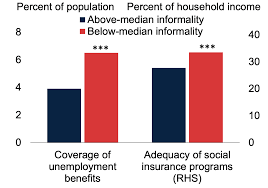Ahmedabad
(Head Office)Address : 506, 3rd EYE THREE (III), Opp. Induben Khakhrawala, Girish Cold Drink Cross Road, CG Road, Navrangpura, Ahmedabad, 380009.
Mobile : 8469231587 / 9586028957
Telephone : 079-40098991
E-mail: dics.upsc@gmail.com

Declining share of informal sector
News: A recent study by SBI has reported that the Indian economy witnessed accelerated formalisation under the distressed conditions of the pandemic and the lockdown last year. The study estimates that the share of the informal economy has fallen to a mere one-fifth of GDP — a figure comparable to many advanced economies.
Background:
• The ILO’s globally accepted framework for definitions is as follows: Informal sector enterprises are defined as private unincorporated enterprises owned by individuals (or households) that are not constituted as separate legal entities independently of their owners.
• They are not registered under specific national legislation (such as Factories’ or Commercial Acts).
• Definition of a formal worker in India: Formal workers in India, on the other hand, are defined as those having access to at least one social security benefit such as a provident fund or healthcare benefits.
Details:
• In 2017-18, as per the latest official statistics, India’s informal sector accounted for approximately 52 per cent of its GDP, employing 82 per cent of the total workforce.
• These ratios have broadly remained unchanged over the last decade.
• As the informal (unorganised) sector bore much of the brunt of the economic contraction during 2020-21, a decline in its share in GDP is unsurprising.
• The sector had neither the financial strength nor the technical wherewithal to face the Covid shock.
• Additionally, policy support, mostly supply-side measures, was mainly focused on firms in the formal sector, with the informal sector left to fend for itself.
Issues:
• Undeniably, the informal sector’s share in GDP is likely to have shrunk due to the Covid shock.
• However, alarmingly, the purported decline in the informal sector’s share in GDP has not been accompanied by an expected reduction in its employment share.
• Data from the official annual Period Labour Force Survey (PLFS) 2017-18 and 2019-20, where the latter includes the period of the Covid shock from April to June 2020, shows that the employment share in nonagricultural informal enterprises has increased from 68 per cent in 2017-18 to 69.5 per cent in 2019-20.
• These figures do not include the agricultural sector, where employment is almost entirely in the informal sector. The increasing share of the formal sector in terms of GDP but declining share in employment only widens the schism (or dualism) between the two sectors.The increasing share of the formal sector in terms of GDP but declining share in employment only widens the schism (or dualism) between the two sectors.
Implications
• The lack of remunerative jobs for the vast majority of Indian consumers implies that eventually the lack of growth in demand will adversely impact investment and economic growth.After all, a mere 17-18 per cent of the workforce in the organised sector cannot sustain growth of the economy in the long run.
• The increase in the formal sector’s share in GDP due to Covid-19 is a result of large, formal enterprises squeezing out informal enterprises.It is important to note here that the increase in formalisation is not a consequence of micro and small informal firms transitioning to formality.
Way forward:
• Over the last five years, the economy has officially witnessed a significant drive towards formalisation.
• It is crucial to recognise that firms exist in the informal sector for various reasons and not simply to evade regulations and taxation.Many own account enterprises and MSMEs cannot afford to survive in the formal sector due to their low productivity.
• It is essential to view the process of formalisation as a development strategy that requires stepping up investment in physical and human capital to boost productivity and the extension of social security benefits for all workers, not just a registration strategy on myriad portals.
• The informal sector will come back to life as much of it represents the survival efforts of the working poor. Celebrating formalisation based on the misery and devastation of poor informal workers (and their meagre productive assets) is not just misplaced but also callous.

Address : 506, 3rd EYE THREE (III), Opp. Induben Khakhrawala, Girish Cold Drink Cross Road, CG Road, Navrangpura, Ahmedabad, 380009.
Mobile : 8469231587 / 9586028957
Telephone : 079-40098991
E-mail: dics.upsc@gmail.com
Address: A-306, The Landmark, Urjanagar-1, Opp. Spicy Street, Kudasan – Por Road, Kudasan, Gandhinagar – 382421
Mobile : 9723832444 / 9723932444
E-mail: dics.gnagar@gmail.com
Address: 2nd Floor, 9 Shivali Society, L&T Circle, opp. Ratri Bazar, Karelibaugh, Vadodara, 390018
Mobile : 9725692037 / 9725692054
E-mail: dics.vadodara@gmail.com
Address: 403, Raj Victoria, Opp. Pal Walkway, Near Galaxy Circle, Pal, Surat-394510
Mobile : 8401031583 / 8401031587
E-mail: dics.surat@gmail.com
Address: 303,305 K 158 Complex Above Magson, Sindhubhavan Road Ahmedabad-380059
Mobile : 9974751177 / 8469231587
E-mail: dicssbr@gmail.com
Address: 57/17, 2nd Floor, Old Rajinder Nagar Market, Bada Bazaar Marg, Delhi-60
Mobile : 9104830862 / 9104830865
E-mail: dics.newdelhi@gmail.com